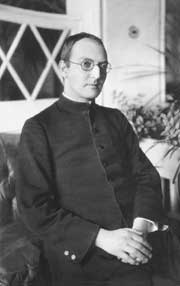archive
Erich Przywara S.J.: The Culture Theologian

- Born
- 12 October 1889, Kattowitz
- Died
- 28 September 1972, Hagen
“Thus all our wandering in Him and to Him is itself a tension between an ineffable proximity and an ineffable distance. Every living thing…everything that happens, is full of His presence. ‘He is not far from us; for in Him we live and move and have our being’. But we grow in our sense of His fullness only in the measure that we do not equate Him with any created thing or circumstance, that is, in the measure that we stand at an ultimate distance from every particular shining of His face. He is the one who lights up before us when we stand at a distance, and who lights up before us to urge us on. He is the infinite light that becomes ever more distant the closer we come to Him. Every finding is the beginning of a new searching.” –Erich Przywara, S.J.
Unless you were a contemporary or are a German scholar, the name Erich Przywara, S.J. might only leave you with a blank expression. He lived from 1889-1972 in Kattowitz, which is located within the borders of Poland. His life mirrors those of the millennial generation; he was born in a decade before the start of a new millennium, one that underwent great cultural changes.
Przywara grew up in “a pluralistic society, attending school with a secular or Jewish background,” so his faith was fostered by his family and parish (O’Meara). But the culture was not simply pluralistic, but viewed as hostile. Kattowitz and much of Poland were under political surveillance, scrutinizing every religious practice under the name of Catholicism. After the Franco-Prussian war, Bismarck stripped any and all power the Catholic Church had in the public sphere of Germany, leaving Protestant offices in charge of Catholic affairs. Eventually, an agreement was had between Rome and Berlin, but the ties between nations were nearly severed.
What is remarkable, under the weight of fear that German Catholics were put in, is Przywara’s continuation in his faith, joining the Jesuits in 1908. However, the effects of the Franco-Prussian victory still pervaded, and the anti-Jesuit laws of 1872 compelled Przywara to Holland in order to begin his novitiate.
He was ordained into the priesthood by 1920, returning home to Kattowitz for his first mass. And though it was a celebration, it was also an eye-opener to the suffering and devastation that the Great War had left behind. The impact grew into a lifelong attention to how “real life and humanity place demands upon speculative philosophy and theology” (O’Meara). Just as students at Loyola learn theory for the sake of praxis, Przywara inched his life toward tying the two more closely together. This attention becomes a parallel, maybe even the foundation, to his work connecting the disparities between the Church and the World, Jesus (the man) and God (the Being), the physical and the spiritual.
Przywara began his writing career within the time of his novitiate, publishing for the first time in 1915 (a hymnal) and again in 1917 (a collection of essays on the Eucharist). Eventually, as we know from bibliographical sources, Przywara had over 800 publications and around 50 books. His keen sense on the disparity between European history and culture led him to his writing on contemporary issues, 0n Christian thinkers such as Augustine, Aquinas and Newman, books on the church year and on conversion (O’Meara).
He wrote well into the 1930s, beginning the first volume of Analogia Entis, where he philosophizes the analogy between God and creation. As the ‘30s progressed into the Second World War, his writings slowly became somber, but definitely did not cease until the “Nazis ended Przywara’s publishing” (O’Meara). It was just not his writing that posed a threat to the Nazi Regime of WWII. His friendships with Edith Stein, Karl Barth, Paul Tillich and Gertrude von Le Fort led the Nazis to their suspicions of Przywara being the “leading intellectual propagandist of Catholic action” (O’Meara).
The end of the Second World War marked a stark difference in Przywara’s writing as he dealt with physical and psychological illnesses. Of course, this did not stop him from his work; he published much into the ‘60s, writing on the state of Catholicism before and after WWII, on ecclesiology, and the upcoming council of Vatican II. But massive cultural upheaval during the ‘40s on top of the social changes of the previous 40 years took a toll on Przywara. His eventual death was not left forgotten, commemorated by his many friends and contemporaries through essays and books about his life and career.
If there is anything to learn from Przywara and the intensities that he lived through, it is that great cultural changes are always just around the corner, asking of our participation. His life provides one of the basic tenets of learning history—to learn from those in the past, whether they were mistakes or successes. Przywara becomes a point in history for us to reflect on, taking into consideration our own cultural systems and how we should move forward with them, if at all.

